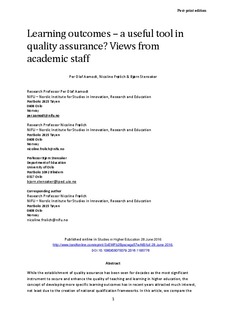Learning outcomes – a useful tool in quality assurance? Views from academic staff
| dc.contributor.author | Aamodt, Per Olaf | |
| dc.contributor.author | Frølich, Nicoline | |
| dc.contributor.author | Stensaker, Bjørn | |
| dc.date.accessioned | 2016-06-30T06:15:58Z | |
| dc.date.accessioned | 2016-07-01T07:42:57Z | |
| dc.date.available | 2016-06-30T06:15:58Z | |
| dc.date.available | 2016-07-01T07:42:57Z | |
| dc.date.issued | 2016 | |
| dc.identifier.issn | 0307-5079 | |
| dc.identifier.uri | http://hdl.handle.net/11250/2395130 | |
| dc.description.abstract | While the establishment of quality assurance has been seen for decades as the most significant instrument to secure and enhance the quality of teaching and learning in higher education, the concept of developing more specific learning outcomes has in recent years attracted much interest, not least due to the creation of national qualification frameworks. In this article, we compare the perceived relevance of the traditional quality assurance approach with the new learning outcomes approach – as seen from the view of the academic staff. Using data from a representative survey among Norwegian academic staff, the study indicates that learning outcomes are perceived as more useful and relevant than traditional quality assurance approaches. The article discusses this finding in light of the current ways quality assurance procedures are functioning in higher education, and points to possible implications for the enhancement of quality in universities and colleges. | nb_NO |
| dc.language.iso | eng | nb_NO |
| dc.subject | higher education policy | nb_NO |
| dc.subject | organization structures | nb_NO |
| dc.subject | research policy | nb_NO |
| dc.subject | governance | nb_NO |
| dc.title | Learning outcomes – a useful tool in quality assurance? Views from academic staff | nb_NO |
| dc.type | Journal article | nb_NO |
| dc.type | Peer reviewed | nb_NO |
| dc.date.updated | 2016-06-30T06:15:58Z | |
| dc.identifier.doi | 10.1080/03075079.2016.1185776 | |
| dc.identifier.cristin | 1365136 |
Tilhørende fil(er)
Denne innførselen finnes i følgende samling(er)
-
4 - Academic Publications / Vitenskapelige publikasjoner [312]
Academic Articles and Book Chapters -
Publikasjoner fra Cristin [344]
